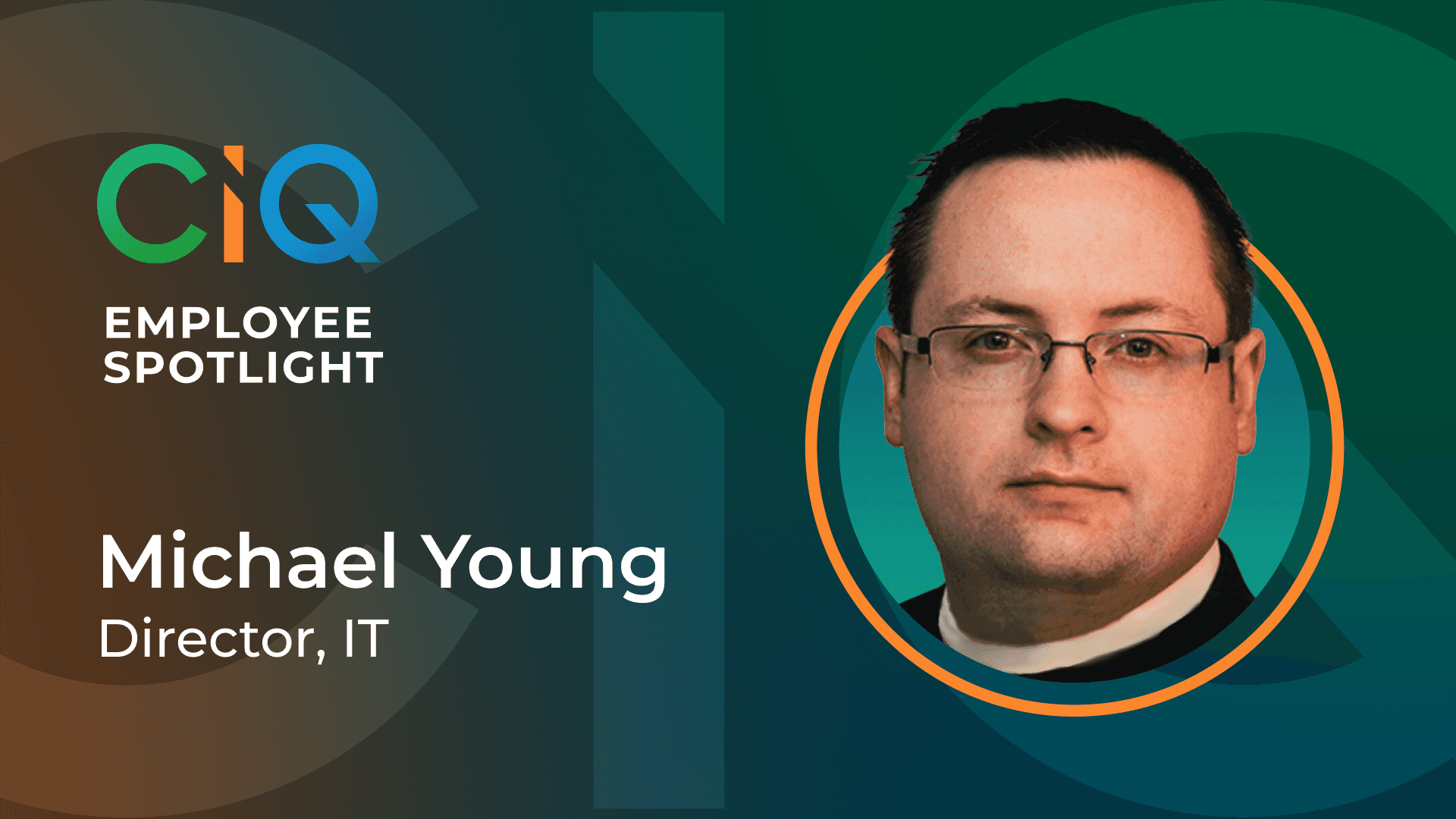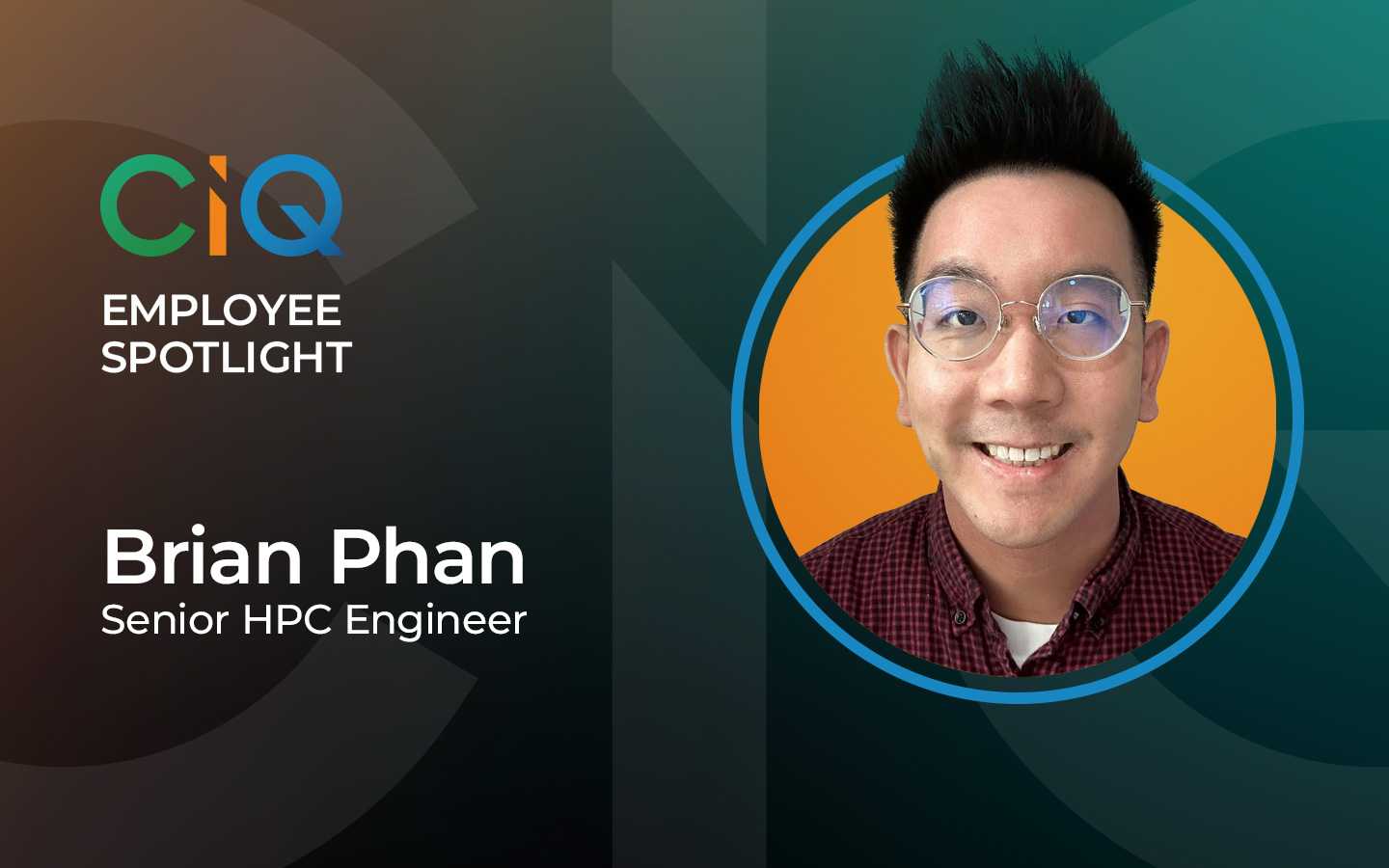6 min read
CIQ Employee Spotlight: Michael Young

This week, we’re turning the spotlight on another stellar CIQ employee, Michael Young. Keep reading to find out about his passion for IT, what keeps him engaged in his field, and why he loves working at CIQ.
What attracted you to a career in technology?
At an early age, my father worked as a manager at a camera store in California, and next door, there was a Radio Shack. One day, he brought home a Tandy 1000, which was our first PC as a family. Being a new, costly device for the family, something that was used for productivity and organizational reasons, we kids were not allowed to touch it. I would stand there and watch my father as he used it and learned by observing. We had some friends come over and show us some games that were programmed in BASIC, which intrigued me. We would play role-playing games on it with my father.
Some years later, I inherited that PC when our next system was purchased for the family. It helped me to write my school reports. I remember messing around with BASIC and writing some very, very elementary stuff, but that was my start with wanting to learn to program and continue to understand this world of technology.
During my teenage years, I recall going to Barnes & Noble (yes, I am dating myself) to look at the latest Visual Basic and C programming books. My interests went from programming to, once we had internet at the house and our own personal web space provided by the ISP, web pages, scripting, and server administration. I would usually purchase the latest issue of PCMag to read about the latest computers, software, and tech gear. I was fortunate to be able to have, while it was limited, access to a computer, and while I didn’t break it for my father, I could learn how the OS (Windows 3.1 and DOS) works and programming fundamentals. Eventually, I started to help my father and others. I was attracted to the idea of being able to build stuff with technology that others would benefit from.
What drew you to CIQ?
Helping others is something that brings me joy. At my prior employer, I was facing the same situation as everyone else who was using CentOS within their IT infrastructure when the big announcement was made, which was the motivation for Rocky Linux being born. This was an opportunity to help others and something that I could use as well. I started volunteering my time and many evenings to figure out, along with the many other community volunteers, how a huge number of packages that make up Rocky Linux needed to be built.
During this time, Gregory Kurtzer, our CEO here at CIQ, was doing some searches on LinkedIn for potential candidates for the Customer Support team that was being formed. Gregory reached out to me when my profile showed up, and he recognized me from the Rocky Linux community.
While some may think this was a step down from what I was doing at my prior employer, this was an opportunity to continue my journey of learning and helping others in technology. It was an opportunity to learn from the experienced and smart professionals we have here at CIQ. Being a startup company, I was ready to do whatever was asked of me to help see this company succeed and grow. I still have that mindset, even as my roles have changed several times in the past few years.
What do you think sets CIQ apart from other organizations?
CIQ is on a mission to make people’s lives better by thinking outside the box. We want to look at things from different angles in our attempt to help others to focus on what they do best. Everyone here wants to do what is right. We work together to solve problems, no matter what department we are in.
We are in a unique position to help other organizations with their current and future infrastructure needs, no matter what industry. We are all learning and growing together as we go.
What's your role in the company, and what do you enjoy most about it?
While I have had some different roles in the past couple of years, with the company growing, we have formed an IT department. My current title is Director of IT, which relates closer to the position I held at my prior employer.
What I enjoy most about this position is working with an awesome team that is eager to learn and not afraid to help others. I’m learning from other leaders within the company and looking for ways to adopt what they are successful at to improve my own leadership skills. It is enjoyable being able to work across the company. Since IT is one of those areas that touches every part of an organization, we have a unique, enjoyable perspective to work along with the different departments and the teams within to help them to perform their work. We have a lot of work to do in supporting the business as it grows. We appreciate all the patience that everyone has with us as we continue to build out the infrastructure, procedures, and documentation.
Describe a typical day at CIQ as the Director of IT.
Well, every day tends to have its own uniqueness. Many times, I start out with a plan, and after a couple of hours, I need to shift focus. That is okay since we are growing, and it is expected. This does help to keep work interesting, that’s for sure.
Typically, I start out looking over our IT service tickets to see if there is anything I can do to assist the team on any blockers. Then, I look at our current projects to get an idea on current progress on our various tasks. I review documentation that has been created. I work on policies, controls, and project planning. We meet together every day as a team over Zoom. Being fully remote, the daily standups have helped our team to feel close, to be on the same page, and to resolve any blockers quickly.
As Director of IT, I am working with vendors, thinking of ways to automate, increase our efficiency as a team, and reduce or eliminate frictions that affect other teams. I work closely with the VP of IT & Hardware and our VP of Compliance and Security. With all that said, every day has a different aspect to it, which helps keep the job enjoyable and non-static.
What's the best thing about leading the IT group?
The best thing about leading the IT team is having the opportunity to share my acquired knowledge and experience with the different team members. To see how this helps them to grow on their career path and to have a role in this is very enjoyable.
How do you manage work-life balance while working on demanding projects?
This is a tough balance since I do enjoy my work, and I am constantly working on being better at the balancing act. That expression “time flies when you are having fun” is for real. I have to set limits for myself to take breaks, even when there are demanding projects. Otherwise, you can get burned out and find yourself staring at the screen since thoughts are not flowing freely. When that happens, it is time to get up and take a break.
It is important to spend time with your family in the evenings and on weekends. When there are deadlines, they will understand that you need to give some extra time, as long as you do not make this a habit and still spend some time with them.
What do you do to stay motivated and inspired in your work?
I enjoy staying up on the latest technology and thinking of ways to leverage it here at CIQ. I read a lot of industry articles and news feeds before starting my day. I also listen to tech podcasts and tech YouTube channels. I have my own little home lab, which currently needs some attention.
I also like to attend conferences where you can hear and see what others are doing. It is inspiring to listen and learn from others about how they are solving problems and helping others.
Taking time to work on things that interest me is another way I stay inspired. Outside of work, I still contribute to open source projects. I don’t contribute as often as I would like to, but that helps me to continue to feel motivated and gives me a good mental break.
What advice would you give to someone considering a career in IT, especially at CIQ?
Do not be content with just getting by. Dig deeper. It is not just about getting something to work and then moving on to the next thing. It is important to truly understand what is happening “behind the scenes” and why it works that way. It will make you better at troubleshooting, solving problems, and thinking of creative ways to improve things.
Get in the habit of looking for ways to be more efficient at what you do. Do not overcomplicate things; keep it simple. Learn how to prioritize what needs to be done.
Built for Scale. Chosen by the World’s Best.
1.4M+
Rocky Linux instances
Being used world wide
90%
Of fortune 100 companies
Use CIQ supported technologies
250k
Avg. monthly downloads
Rocky Linux



